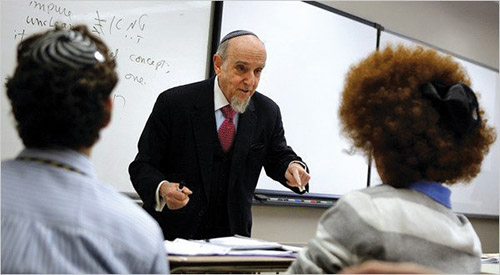
Rabbi Moshe Schochet, a rebbe at Weinbaum Yeshiva High School, in Boca Raton, Florida, recently raised an interesting question: “What exactly is the role of a Jewish educator outside of the classroom and outside of school?” Everyone understands the importance of teachers as role models. It is also understood that within the confines of the school, teachers exercise great influence over their students.
How far does this influence extend? Are there parameters, formal or otherwise, beyond which a teacher should or should not venture? Does a teacher’s influence extend beyond the year in which a student is in his/her classroom? Is there a difference in these roles for large metropolitan cities vs. smaller communities?
The question is also related to how a teacher is viewed by his/her community. Must a teacher always be “on”? Does a rebbe always have to wear a suit and tie, even in the supermarket? Can a morah appear in public in sneakers? Where do we draw the line?
In school for example, a teacher can reprimand a student for not wearing tzitzit. Is it appropriate to do so after school at a playground? It is proper to encourage students to daven properly in school. What should a teacher do when he sees a student coming late to shul or talking during davening on Shabbat? When teachers live in the same town as their students they will inevitably run into each other. What should a teacher’s response be when observing a student inappropriately dressed, using coarse language or behaving in a way that is unbecoming?
On the other hand, if a teacher lets it slide will the student take that as tacit approval? These are all challenging questions. We know that many teachers develop long-term relationships with their students long after their time in the classroom. We also know that in smaller communities this bond is often reinforced by after-school engagements, Shabbat and holiday meals, melave malkas etc.
Every teacher goes into the profession to make a difference. Teachers of limudei kodesh feel an extra sense of responsibility to help their students develop religiously. Therefore, Judaism is not limited to school hours. As Rabbi Shochet observed, “I think that conversations between teachers and students about “life outside of school” must be addressed. These interactions obviously must be well thought out before being verbalized, but are integral to Jewish education. However, we can’t speak “to” our students; instead we must speak “with” our students. Students can and will be receptive to our thoughts and perspectives (and sometimes even constructive criticism); they just need to sense that those who are sharing it with them care deeply about them and are not simply trying to give them mussar.”
It is clear that teachers can have an important role outside of school. Often teachers work at summer camps attended by their students. In this informal setting much can be accomplished. But even in school, as in all human interactions, you get more with honey than with vinegar.
I want to share an email I received from a former student last year:
“I don’t expect you to remember every student. I was a bit of a trouble-maker in high school and spent my fair share of time in your office. Not so much as a punishment, but by choice. You spoke to me—a long haired, self important teenager, as one would speak to an adult. I always enjoyed our conversations—some serious, some less so.
One day, in the middle of my senior year, at the end of one of our conversations, you threw out, “I think you should take a look at Sha’alvim, I think you’d like it.” Miraculously, I took it to heart. I imagine it was because of “street-cred” you built up with me. It turned out to be the watershed moment in my life.
I spent two years in Sha’alvim, then volunteered for the army with four friends, came back to Sha’alvim for the summer after. Then to YU, then NYU for dental school and a two-year dental and surgical residency in Brookdale Hospital.
My wife and I live in Neve Daniel with our eight children BH. The oldest is married, the second in the army—third year hesder, etc. We have fostered 10 abandoned babies. I have written five sets of tfillin for my boys…. so far—two more to go BH.
I have done hundreds of britot for boys here and in eastern Europe at no charge.
I have a steady chavruta after vatikin daily, and am in the middle of my fourth time through shas.
I tell you this, because I often credit you with much of my life story. It was the perfect word at the perfect time, and it worked. I often wonder where I would have wound up without the right adult giving me a gentle push onto the right path.
I have often thought of seeking you out to let you know all this, but dropped the ball.
Yesterday, I received a beautiful email from a boy I taught in the gush last year, where I gave a chaburah on medical ethics.
It was just the push I needed to find you and let you know what you did for me… and my family.
May you always have the chochma and the koach and health to continue to help people find their way.
Thank you!”
Sometimes the right word, at the right time, in the right way, can change lives.
By Wallace Greene
Rabbi Dr. Wallace Greene was a successful day school principal, administrator and day school consultant.










